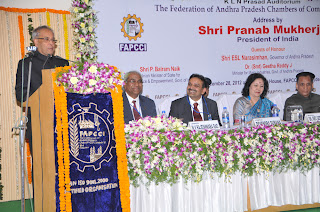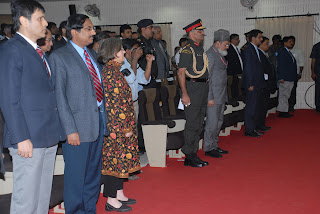The Federation
of Andhra Pradesh Chambers of Commerce & Industry organized
an interactive meeting with H.E. Mr.
Goncharuk Petro, Deputy Head, Zaporizhzhya Regional State Administration and
H.E. Mr. Oleksii V.Stepanov, Deputy Head, Embassy, Minister-Counsellor, Deputy
Ambassador of Ukraine Embassy on 15th November 2012 at Federation
House, Red Hills, Hyderabad.
In this occasion FAPCCI and Zaporizhya
Chamber of Commerce signed Joint Cooperation Agreement to establish and develop
trade and economic relations.
Mr.
Devendra Surana, President, FAPCCI stated in his welcome address is that There is tremendous scope for cooperation in the areas of mechanical
engineering, shipbuilding, light industry, mining, metallurgy, steel, coking
industry, construction of road and rail networks in India etc. Ukraine is a
well-known manufacturer of world class gas and steel turbines for thermal,
hydel and nuclear power plants, compressors, transformers, pumps, motors
equipment for laying power transmission lines etc. Ukraine is keen to explore
new avenues of joint development of power projects in India. I am sure; the members present will explore
the business opportunities available in Ukraine, for increasing the trade
between the countries.
Investment opportunities in the State of Andhra Pradesh are abundant specifically in the manufacturing sector which includes food processing, floriculture, agro processing, petrochemicals, metals, textiles, leather, mining, transport equipment, telecom and so on. The infrastructure sector is rife with opportunities, be it the areas of power, ports, roads, bridges, telecom facilities, development of coasts, waterways… Financial services, R&D and Tourism, particularly medical tourism, offer plenty of scope for investment. I request you to kindly impress upon the Ukraine Businessmen and invite them to our State for exploring the business opportunities Mr. Devendra Surana said.

Mr.
Oleksii V.Stepanov, Deputy Head, Embassy, Minister-Counsellor, Deputy
Ambassador of Ukraine Embassy stated that the Ukraine is looking regional
cooperation with the Government as well as from the industrialists to
strengthen the bilateral trade between Ukraine and India. Ukraine and India’s
bilateral trade has been very strong, has contributed more than 58 million US$
in Zaporozhye region in import and export.
Mr. Devendra Surana, President, FAPCCI, Mr. Srinivas Ayyadevara, Senior Vice President, FAPCCI, Mr. Grachev Serhiy Volodymyrovych, Head, Vasylievska District State Administration of Zaporizhzhya Region, Mr. Mezheyko Biktor Ivanovych, Chairman of the Standing Commission on Humanitarian Issues, Zaporizhzhya Regional Council, Dr.B. Divya Sunitha Raj, Indian Representative, USCIE, Ministry of Education, Science, Youth and Sport of Ukraine, Mr. Roman Puriy, First Secretary, Embassy of Ukraine, Mr. Shamilov Volodymyr Ivanovych, President, Zaporizhzhya Chamber of Trade and Industry, Mr. Kuts Andriy Vyacheslavovych, Vice President, Zaporizhzhya Chamber of Trade and Industry, Mr. Krasnoselskyi Vitalii Ignatiyovych, General Director, LLC, Zaporizhzhya Regional Agency for External Trade, Mr. Yakovenko Yuriy Petrovych, Head of the Board of Directors, Trest, Zaporizhaluminiumstroy, Belikov Serhiy Borysovych, Rector, Zaporizhzhya National Technical University, Mr. Arfanitskyi Stanislav Serhiyovych, Economist, Eltiz, Private Enterprise, Mr. V.S.R. Murthy, Director, NIMSTL of India and NEO Star India of Ukraine, Dr.BVK Raj, CEO, NEO NIMSTL, US Flight Academy, Texas, USA, Mr. Shyam Sunder Pasari, Chairman, International Trade Relations Committee and Mr. M.V. Rajeshwara Rao are the other speakers at the meeting.


















































